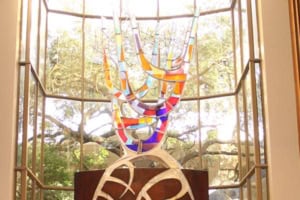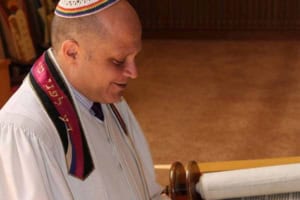In 1939, Rabbi Milton Steinberg wrote an extraordinary work of historical fiction entitled As a Driven Leaf. It tells the story of Elisha ben Abuyah, the Talmudic sage who becomes a heretic—not because he rejects Judaism, but because he can no longer make sense of it. Steinberg imagines Elisha as a man pulled in every direction—by love and loss, by the trauma of Roman persecution, by the allure of reason and philosophy, and by the lingering voice of tradition he can’t seem to silence. He is a man searching for certainty, but constantly blown off course. He is carried, almost helplessly, by the winds of curiosity, grief, and doubt—caught between faith and secularity, between the God he longs for and the silence that too often meets him.
The title of the novel comes from the Book of Job, where Job, devastated and bewildered, cries out to God: “Will You harass a driven leaf and pursue dry stubble?” (Job 13:25) It’s not just a complaint—it’s a confession. Job is saying: “I am being carried in so many directions—by pain and anguish, by mystery and frustration, by longing and prayerfulness.
I am literally following in the circuitous path of a driven leaf, not knowing from which direction, or for what reason, my life will turn.”
And in that image—of a soul caught in forces it cannot control—I think many of us hear ourselves. Because lately, being Jewish can feel like that. We are blown about by the winds of geopolitics, by headlines that change daily but never leave us out of the story. We are caught in the swirl of media narratives, where nuance dies, and Jews become symbols instead of people.
We are haunted by the sense that no matter how grounded we try to be, we’re still seen as precarious, suspect, conditional.
The truth is, however — we are not stumbling. We are doing our best to stand tall, to stay upright, to walk forward with dignity. But we’re still looking over our shoulders. That’s why the verse from this week’s Torah portion, Bechukotai, cuts so close to the bone: “You shall stumble, though no one pursues you.” (Leviticus 26:17)
It’s not that we’re falling—but we fear we might. It’s not that someone is always chasing—but we act like someone could be. Our internal radar is always on. We watch. We scan. We prepare. Especially since October 7th, that radar has been reactivated – a felt sense. A tightening. A knowing. A dread. And that’s what makes this week’s Torah reading particularly startling. Because nestled among the warnings of Bechukotai is this verse: “…the sound of the driven leaf shall put them into flight; they shall flee as one flees from the sword, and they shall fall though none pursues.” (lev. 26:36).
It’s not a poetic image, nor a literary invention. It’s Torah. An ancient articulation of a very modern anxiety. We don’t need to be actually chased—just a sound – even of a driven leaf. The whisper. The possibility. And we run.
And just when we begin to think—maybe we can stop running, maybe we can exhale, maybe we’re imagining it — Washington, D.C. happens. Two Jews, Yaron Lischinsky and Sarah Lynn Milgrom, attending an American Jewish Committee event at the Capitol Jewish Museum, murdered in cold blood because they were Jews.
An unmitigated act of anti-Semetic terror. They weren’t at a political rally. They weren’t marching or protesting. Just a program for young diplomats. And that’s all it took. It is so sad, so heartbreaking. Our prayers of strength and love and faith that we send to their families and communities, we pray will be received powerfully and soon. And suddenly the fear we were trying to quiet is confirmed. The shock and brazenness of the tragedy is breathtaking. The radar wasn’t lying.
We realize in that moment, Leviticus 26:36 is no longer ancient—it’s the morning news. The sound of a driven leaf shall put them to flight.
In moments like this, it’s easy to feel paralyzed. By sadness. By fear. By the weariness of being misunderstood, misrepresented, and once again reminded that even here—even now—we are not immune. And so I find myself coming back to another ancient voice, another deep and anguished question. This time from the prophet Isaiah, who cries out:“I cry out—what shall I cry?” (Isaiah 40:6)
It’s a question that isn’t looking for an answer. It’s an expression of helplessness, and maybe even a kind of holy exhaustion. What do you want me to say? How do I make sense of this world, where leaves are still being driven and people are still being pursued for simply existing?
And yet, the brilliance of Isaiah’s cry is that he cries anyway. He doesn’t stay silent. He doesn’t numb out. He doesn’t walk away from his people or his God.
He cries out—because that’s what we do. That’s what Judaism has always done: We cry out, and we carry on. We cry out, and we recommit. We cry out—not because we’re weak, but because we care too much to be quiet.
So how do we respond?
We name what’s happening. Antisemitism and anti-Israel hatred pure and simple. We stop apologizing for noticing it and we stop letting others tell us we are imagining it.
We teach our children not just how to be safe, but how to be proud. We show up—for Israel, for each other, and for the values we believe in. And we remember that while the Torah gives us warnings, it also gives us covenant. It ends the portion not in despair, but in God’s voice saying: “Yet even then… I will not reject them or spurn them… for I am the Eternal, their God.” (Leviticus 26:44)
Even then. Even now. We are still in relationship – still in sacred partnership with a God who has never promised an easy path, but who has always promised that we would never walk it alone.
So yes—we may feel like a driven leaf. Tossed by winds we didn’t choose. Pursued by fears we thought we had outrun. Moved by grief and shaken by violence. But we are not without roots. We are not without purpose. And we are not without each other.
Because even a driven leaf, when it lands, becomes part of something larger— it nourishes the ground, it becomes the soil for something new to grow.
So we cry out. We take our place. And we plant ourselves again—in courage, in covenant, in hope.
Amen.





